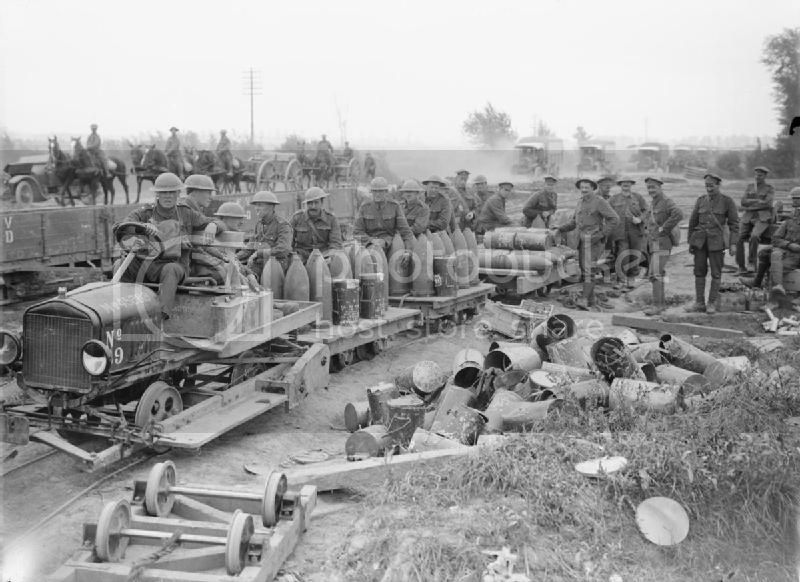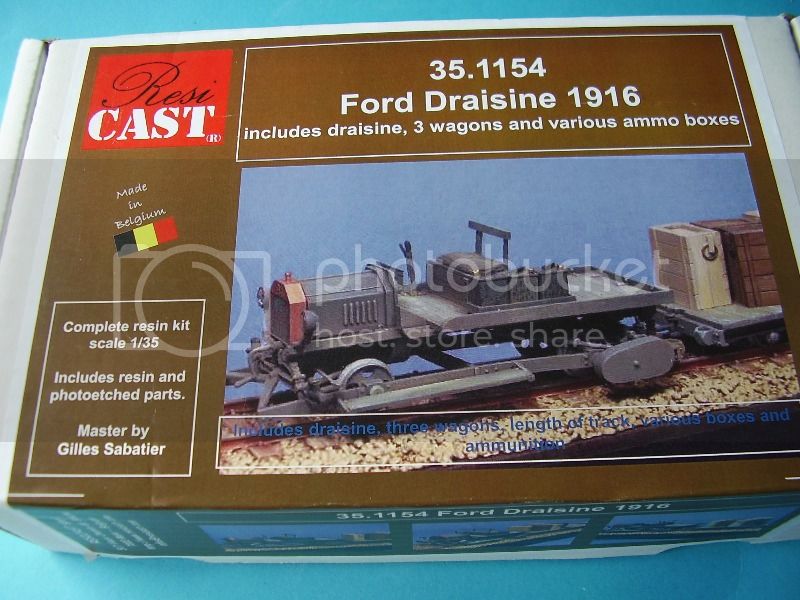This is a Bundesarchiv film from WW1 that I saw on another forum. I'm posting it here as I thought it could be useful in either suggesting ideas for dioramas, or for accurately modeling WW1 landscapes - with no need to include a railway element. For myself, I found it much more informative than just looking at still photos.
The rails are at 60 cm (~2 feet), the same as used by the French, and their allies.
http://www.filmportal.de/video/mit-der-feldbahn-an-der-front-im-westen
Hosted by Darren Baker
Feldbahn on the Western Front

velotrain

Joined: December 23, 2010
KitMaker: 384 posts
Armorama: 320 posts

Posted: Tuesday, September 03, 2013 - 02:37 PM UTC
Posted: Wednesday, September 04, 2013 - 05:29 PM UTC
Charles,
Great find. A Teutonic Porter-type!
Great find. A Teutonic Porter-type!
Posted: Wednesday, September 04, 2013 - 10:26 PM UTC
Hi Charles,
Many thanks, and timely too as I bought the Resicast Draisine for the WW1 Campaign, so lots of useable images.
Al
Many thanks, and timely too as I bought the Resicast Draisine for the WW1 Campaign, so lots of useable images.
Al


velotrain

Joined: December 23, 2010
KitMaker: 384 posts
Armorama: 320 posts

Posted: Wednesday, September 04, 2013 - 10:44 PM UTC
I've been surprised at the number of pallets, as I always associated them more with WW2. And this is the Germans, who in some ways were behind technically.
How about these Smart Car draisines?
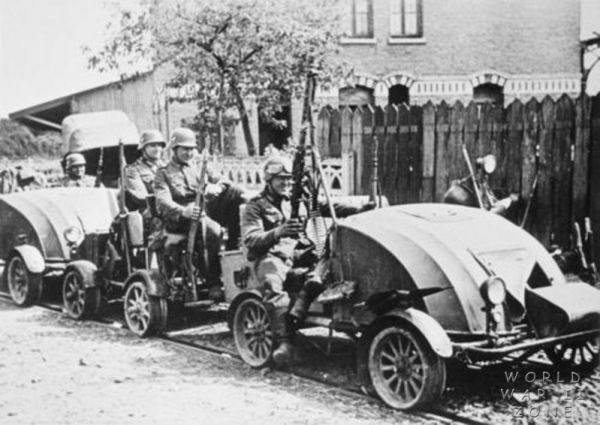
I think this was in Poland, and they might be Polish built.
How about these Smart Car draisines?

I think this was in Poland, and they might be Polish built.
Posted: Wednesday, September 04, 2013 - 11:27 PM UTC

velotrain

Joined: December 23, 2010
KitMaker: 384 posts
Armorama: 320 posts

Posted: Thursday, September 05, 2013 - 01:25 PM UTC
Thanks much for posting that image Al. It's particularly interesting in that three modes of tranportation are represented in close proximity.
I haven't checked on the Resicast kit - is it similar to the draisine in the photo? I'm guessing the British/Commonwealth troops called them something else ;-)

Here's an interesting image I found yesterday - a stretcher car based on a Type D wagon. Simplex 20HP Tractor next to it. Scale Link do both of them in 1:32.
http://www.scalelink.co.uk/acatalog/Scalelink_Narrow_Gauge__60cm__Railway_33.html
I haven't checked on the Resicast kit - is it similar to the draisine in the photo? I'm guessing the British/Commonwealth troops called them something else ;-)

Here's an interesting image I found yesterday - a stretcher car based on a Type D wagon. Simplex 20HP Tractor next to it. Scale Link do both of them in 1:32.
http://www.scalelink.co.uk/acatalog/Scalelink_Narrow_Gauge__60cm__Railway_33.html
Posted: Thursday, September 05, 2013 - 08:12 PM UTC

velotrain

Joined: December 23, 2010
KitMaker: 384 posts
Armorama: 320 posts

Posted: Thursday, September 05, 2013 - 08:26 PM UTC
The radiator and hood (bonnet to some of you) shape are different, but otherwise I'd say they nailed it. The number of gas cans is spot on ;-)
I had bought a London bus to make the pigeon coop truck, but may have to reconsider.
I had bought a London bus to make the pigeon coop truck, but may have to reconsider.
Posted: Thursday, September 05, 2013 - 09:17 PM UTC
Quoted Text
The radiator and hood (bonnet to some of you) shape are different, but otherwise I'd say they nailed it. The number of gas cans is spot on ;-)
I had bought a London bus to make the pigeon coop truck, but may have to reconsider.
Hi Charles,
The Pigeon coup would be cool. I'll await a 1/35 scale vehicle for that.
Cheers
Al
Posted: Sunday, September 08, 2013 - 01:01 AM UTC
Hi Charles,
It would be good to see developments in the light railway stuff available in 1/35 scale. I'd love to see the Simplex tractor either the open topped version or the armoured one.
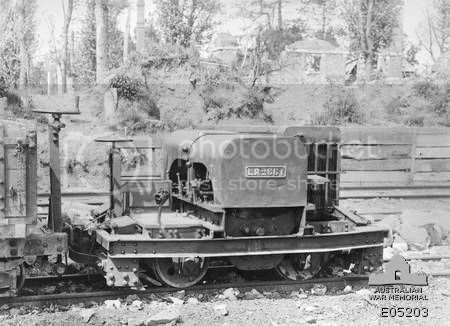


As an alternative George Moore is working on the Holt Tractor which should be out early next year if not before. I saw some of the master when I was over in Belgium and it looks like it will be a great kit.

Cheers
Al
It would be good to see developments in the light railway stuff available in 1/35 scale. I'd love to see the Simplex tractor either the open topped version or the armoured one.



As an alternative George Moore is working on the Holt Tractor which should be out early next year if not before. I saw some of the master when I was over in Belgium and it looks like it will be a great kit.

Cheers
Al

velotrain

Joined: December 23, 2010
KitMaker: 384 posts
Armorama: 320 posts

Posted: Sunday, September 08, 2013 - 05:15 PM UTC
Alan – Let me first say that I ran across your review of the Ford draisine and thought it was very well done. I especially like that you gave the background for the development of this vehicle. So that’s why you’re using this kit for the WW1 campaign ;-)
I believe there were at least four models of the Simplex. On the 20hp version, the “bent” or “bow” frame was built of channel steel, as shown in the photos that you posted.
For the 40hp versions built for the WDLR (War Department Light Railways), The frame maintained the same elongated octagon shape, but was constructed of plate steel, causing these engines to be commonly known as plate-frame Simplexes. There were three variations with differing amounts of protection, based on how close to the front line they were expected to operate. The “Protected” version that you show was in the middle, with the sliding shrapnel-proof side doors.
This is the lesser protected “Open” model, although they originally had a canopy roof of light steel. One site describes the Open as “consisting of heavy steel curved end plates covering the vital parts”; apparently the driver was not considered a vital part, or perhaps just more easily replaceable.
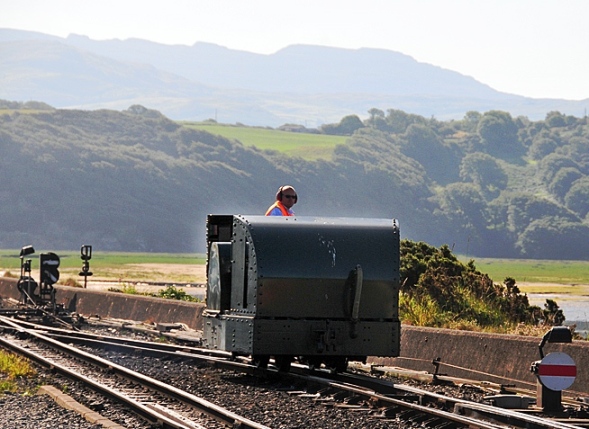
Here is the fully “Armoured” (it is British after all) version, with an armour-plated roof that curved down at each end, and vision slits for the driver; this was designed for operation in the most dangerous forward areas. This had been in a museum, which is why there is a window for peering into the interior. Apparently the Protected and Armoured versions were collectively known as “tin turtles”.
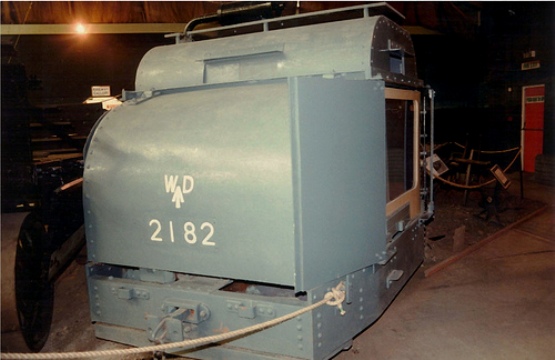
Here is a short video of the open Simplex owned by the famed NG Festiniog Railway in Wales.
http://www.youtube.com/watch?v=8_tzIHcbkM8
I also found another film, although this one is in France and not near the front. There are British, American, Australian and Canadian troops, but no French ones. Scenes of track being laid, including the pre-assembled panel-track. A Baldwin steam engine coming off a ship, as well as Baldwins running. There is one scene where a section of panel track is removed from an existing line so that a newer one can be built right through it!
Warning – turn your sound off, or you’ll hear the projector running the whole time.
http://www.youtube.com/watch?v=F3s01i3aa7w&feature=related
I kept seeing references to another film that showed American steam engines and railway cars being assembled in France, as it was more space-efficient to ship them broken down. However, it seems to have been deleted from youtube.
Here is a site with a lot of WW1 light railway photos:
http://www.histomil.com/viewtopic.php?t=5865
You’ll notice what look like bricks stacked on the small French steam engines. These are pressed coal-dust bricks, which were used to fuel many European steam engines at the time.
I believe there were at least four models of the Simplex. On the 20hp version, the “bent” or “bow” frame was built of channel steel, as shown in the photos that you posted.
For the 40hp versions built for the WDLR (War Department Light Railways), The frame maintained the same elongated octagon shape, but was constructed of plate steel, causing these engines to be commonly known as plate-frame Simplexes. There were three variations with differing amounts of protection, based on how close to the front line they were expected to operate. The “Protected” version that you show was in the middle, with the sliding shrapnel-proof side doors.
This is the lesser protected “Open” model, although they originally had a canopy roof of light steel. One site describes the Open as “consisting of heavy steel curved end plates covering the vital parts”; apparently the driver was not considered a vital part, or perhaps just more easily replaceable.

Here is the fully “Armoured” (it is British after all) version, with an armour-plated roof that curved down at each end, and vision slits for the driver; this was designed for operation in the most dangerous forward areas. This had been in a museum, which is why there is a window for peering into the interior. Apparently the Protected and Armoured versions were collectively known as “tin turtles”.

Here is a short video of the open Simplex owned by the famed NG Festiniog Railway in Wales.
http://www.youtube.com/watch?v=8_tzIHcbkM8
I also found another film, although this one is in France and not near the front. There are British, American, Australian and Canadian troops, but no French ones. Scenes of track being laid, including the pre-assembled panel-track. A Baldwin steam engine coming off a ship, as well as Baldwins running. There is one scene where a section of panel track is removed from an existing line so that a newer one can be built right through it!
Warning – turn your sound off, or you’ll hear the projector running the whole time.
http://www.youtube.com/watch?v=F3s01i3aa7w&feature=related
I kept seeing references to another film that showed American steam engines and railway cars being assembled in France, as it was more space-efficient to ship them broken down. However, it seems to have been deleted from youtube.
Here is a site with a lot of WW1 light railway photos:
http://www.histomil.com/viewtopic.php?t=5865
You’ll notice what look like bricks stacked on the small French steam engines. These are pressed coal-dust bricks, which were used to fuel many European steam engines at the time.
Posted: Monday, September 09, 2013 - 11:12 AM UTC
Hi Charles,
Many thanks for the links. I haven't had a chance to check them out yet but much appreciated.
Cheers
Al
Many thanks for the links. I haven't had a chance to check them out yet but much appreciated.
Cheers
Al
Posted: Tuesday, September 17, 2013 - 04:35 AM UTC
W^D Models is producing a number of LRW items in 1/76: W^D Models 

 |










